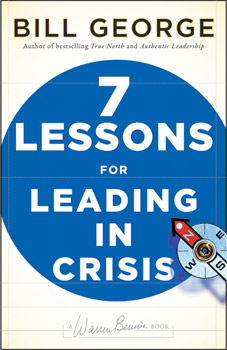Book review
Author: Bill George
Title: 7 Lessons for leading in crisis
Publisher: Jossey-Bass
ISBN: 9780470531877
Price: €16.80
Bill George is one of the outstanding US CEOs of his generation, having led Medtronic to market dominance in its field. This, his latest book, is written for today’s business leader, one now faced with unprecedented economic challenges, and the lessons gleaned are as applicable to the public sector as the private sector.
George believes the global crisis was caused by the failed leadership of leaders failing to follow their “True North”, that “internal compass of beliefs” guiding their everyday interaction with others; indeed, the current “crisis” is a great opportunity to develop your leadership.

Early on, the author pinpoints the origins of the recent global economic turmoil: going back to the early 1970s, it was economists who argued that “shareholder value should be the primary measure of corporate performance”, i.e. the stock price became the byword for a company’s value. So corporations became enslaved to the notion of maximising returns to shareholders, and these same organisations dropped the ball on all of those things that really matter, like customer satisfaction. The writer identifies “authentic leaders”, people of the highest integrity and commitment, as the kind of leaders the world needs now. He quotes Drucker: “Leadership is responsibility”. This is the most compelling exposition of the current economic crisis I have read.
What are the “7 Lessons” then and how will they help you tackle issues as a leader?
- Face reality, starting with yourself – the leader must identify what the reality is, acknowledge the crisis and ensure acceptance, ownership, throughout the organisation of the problem;
- Don’t be Atlas; get the world off your shoulders – leadership is a lonely job so it is vital to build, and share with, a multi-skilled team around you to be a more effective leader;
- Dig deep for the root cause – insist on getting the whole story and gather your own firsthand information – get out and find out! And remember – the leader’s role is to create the environment to resolve the problem;
- Get ready for the long haul – private sector examples abound in this chapter, which focuses on how leader’s need to enable their organisation to compete in the long term;
- Never waste a good crisis – “the real tragedy occurs when management wastes a golden opportunity to transform itself”;
- You’re in the spotlight – follow True North – the author points out that in a crisis, publicly at least, everything is amplified one hundredfold. It is imperative, therefore, to be transparent and candid in your leadership of a situation and, above all, the leader should exude confidence in taking responsibility for the consequences of his or her actions – “‘credibility” is key;
- Go on the offense (ive) – focus on winning now – the author identifies 7 steps to focus on “‘winning”, i.e. turning the crisis into an opportunity to transform your organisation. Although devised from a private sector viewpoint, there is enough here to inspire healthcare managers in the drastically changed economic climate.
In concluding his work, George identifies “‘health care” as one of the six major problems areas facing the world today. No one organisation can solve these problems on its own, so it is up to leaders to use their gifts to change a small portion of the problem. By staying on course of your True North, you can make a difference.
It’s hard not to like this timely, concise, case-study-filled guide – the format is simple: having introduced his 7 lessons early on, the author walks the reader through each one and draws his conclusions.
Reviewed by Carl Hubbard, Communications Centre Manager, Mater Hospital, Dublin

